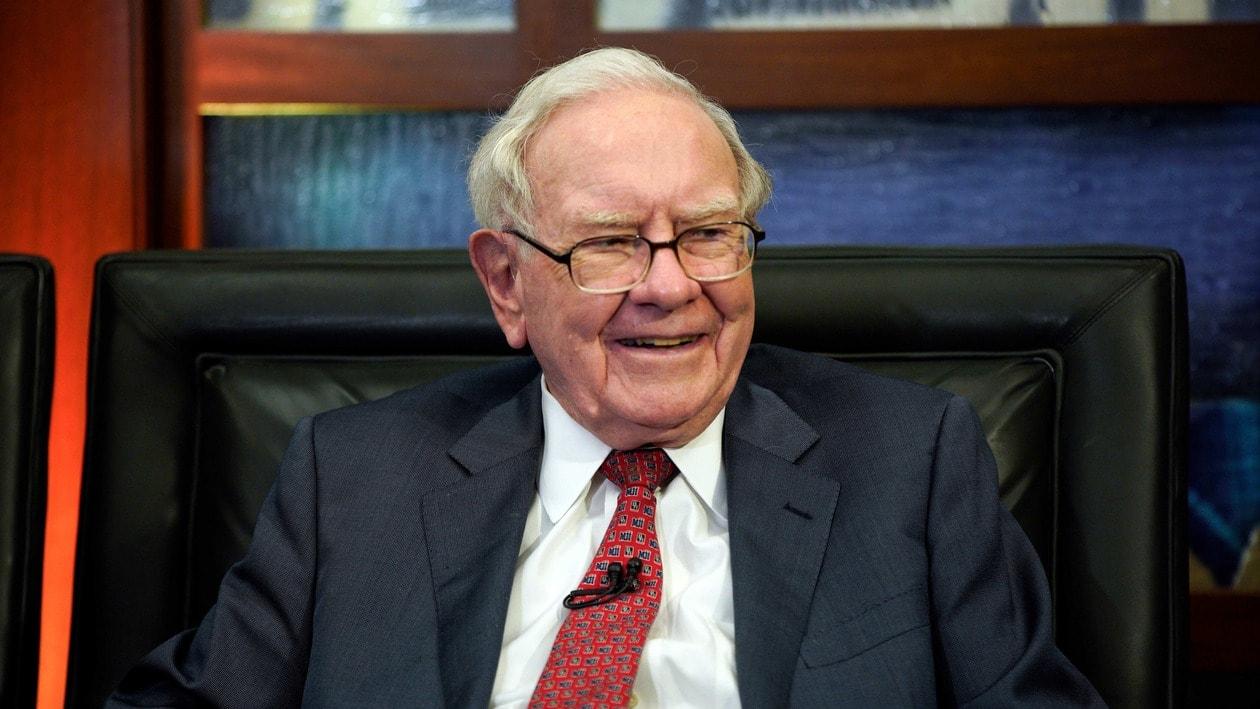(Bloomberg Opinion) -- There was very little in the way of news in the annual letter to Berkshire Hathaway Inc. shareholders that Warren Buffett released Saturday morning. Buffett did mention that “Berkshire had a good year in 2022,” with operating earnings of $30.8 billion, and disclosed that subsidiary See’s Candies sold $400,309, or 11 tons, of its peanut brittle and chocolates at last year’s annual meeting in Omaha. But the main thing that stood out about the letter was its brevity — at 4,455 words, it was the shortest Buffett shareholder letter in 44 years.
Yes, I began assembling this data before the new letter came out — I suspected there might not be a lot else to discuss. The trajectory was already giving the unmistakable signal that the Berkshire chairman is winding things down. And, well, of course he is: Buffett is 92; his longtime business partner, Berkshire Vice Chairman Charles Munger, is 99.
The big spike on the chart is from the 2014 letter (published in February 2015), when Buffett offered a look back at the 50 years since he had taken control of a faltering Massachusetts textile manufacturer and began its long transformation into an investment vehicle and industrial giant; Munger chimed in with his own 2,430-word review. This look back involved acknowledging lots of mistakes, which has become something of a Buffett trademark. His 25-anniversary review was even titled “Mistakes of the First Twenty-five Years (A Condensed Version).” The latest missive included four uses of the word, too, which relative to the letter’s small overall word count turns out to be a lot by Buffett standards.
In the letter accompanying Berkshire’s 1985 annual report, Buffett attributed the focus on mistakes to Munger, who “has always emphasized the study of mistakes rather than successes, both in business and other aspects of life.” Such emphasis does not appear to be the norm among American investing icons and corporate superstars. I looked through the oeuvre of Amazon.com Inc. founder and former Chief Executive Officer Jeff Bezos, also known for his smart shareholder letters, and in 24 years of letters found just five uses of “mistake,” only three of which could be construed as Bezos acknowledging that he had made or might make one.
Not all the Buffett “mistakes” tallied above were his mistakes either, but most were. After attempting to separate the non-confessional uses of the word in the Berkshire letters and being stymied by a couple of judgment calls, I decided they should all count.
Does the frequency of their use tell us anything? The Berkshire shareholder letters feature a table comparing the company’s stock price performance every year since 1965 with the total return of the Standard & Poor’s 500 Index. Subtract the second from the first to measure Berkshire’s relative performance, and the result turns out be correlated with the frequency of “mistake” appearances in the shareholder letter for that year. The r-squared is 0.33, implying that Berkshire’s relative performance “explains” a third of the mistake-frequency in the letters. Which makes sense — most of us tend to be more magnanimous about acknowledging our faults when things are going well.
More generally, it’s easy to say things like “most of my capital-allocation decisions have been no better than so-so,” as Buffett does in his latest letter, if you’re widely acknowledged to be one of the world’s greatest-ever capital allocators. This exercise might be more informative if it included more of the pre-success, pre-fame Buffett, with letters to investors in his Buffett Partnership and Berkshire shareholder letters predating those that the company makes available on its website. Maybe next time (getting all those letters into searchable form might take a while).
Or maybe not — all this number-crunching is, I’ll admit, a bit silly. But it’s interesting, right? And you still want to know whether Buffett’s “mistake” mentions predict future Berkshire performance, right?
On a short-term basis, the answer is no. The correlation between “mistake” frequency in the shareholder letter and Berkshire’s subsequent one-year performance relative to the S&P 500 is effectively zero. Buffett has always been disdainful of short-term performance metrics, though, so I also looked into the link between mistake mentions and average outperformance over the subsequent five years. Sure enough, there is one, with an r-squared of 0.32 and p value (the probability of obtaining such a result by random chance) of just 0.001.
This is mainly testimony to the limitations of such statistical tests. I don’t really think that Warren Buffett’s heavy use of the word “mistake” in his late-1970s shareholder letters was responsible for Berkshire outperforming the S&P 500 by an average of 30 percentage points a year from 1979 through 1989. But there are worse lessons one can take from Buffett’s investing success than that acknowledging and examining mistakes pays off.
Justin Fox is a Bloomberg Opinion columnist covering business. A former editorial director of Harvard Business Review, he has written for Time, Fortune and American Banker. He is author of “The Myth of the Rational Market.”
